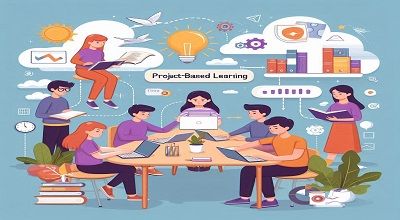Modern Project-Based Learning
Modern Project-Based Learning: In the ever-evolving landscape of education, traditional teaching methods are giving way to more dynamic. Student-centered approaches, with project-based learning (PBL) taking center stage. PBL encourages students to actively engage in the learning process by working on real-world projects. That require critical thinking, collaboration, and problem-solving skills. As we navigate the demands of the 21st century, it’s crucial to identify the key elements. That make modern project-based learning effective. Here are five essential components that students need for success in modern PBL.
Meaningful and Relevant Projects:
The heart of project-based learning lies in the projects themselves. To engage and motivate students, projects must be meaningful and relevant to their lives. Modern PBL should bridge the gap between classroom learning and the real world, addressing current issues and challenges. Whether it’s solving a community problem, exploring a scientific phenomenon, or creating a digital solution, projects should resonate with students’ interests and have a tangible impact. This relevance not only enhances student engagement but also fosters a sense of purpose in their learning journey.
Collaborative Learning Environments:
Collaboration is a cornerstone of modern project-based learning. In today’s interconnected world, students need to develop strong teamwork and communication skills. PBL provides an ideal platform for students to collaborate on complex tasks, share diverse perspectives, and learn from one another. Teachers play a crucial role in fostering a collaborative learning environment by facilitating group discussions. Promoting effective communication strategies, and encouraging the sharing of ideas. These collaborative experiences prepare students for the collaborative nature of the workforce they will enter in the future.
Technology Integration:
In the digital age, incorporating technology is essential for preparing students for the challenges they will face in their future careers. Modern project-based learning should leverage technology as a tool for research, communication, and presentation. Students can utilize various digital resources, platforms, and tools to enhance their projects. Conduct in-depth research, and showcase their findings in innovative ways. Integrating technology into PBL not only reflects the reality of the modern workplace. But also equips students with valuable digital literacy skills.
Assessment for Learning:
Assessment in modern project-based learning goes beyond traditional exams and quizzes. Instead, it focuses on assessing the process of learning and the development of essential skills. Teachers should employ a variety of formative assessment techniques to monitor students’ progress. Provide timely feedback, and guide their learning journey. This continuous assessment allows for adjustments and improvements throughout the project. Emphasizing the importance of learning from both successes and setbacks. By shifting the focus from grades to skill development, modern PBL encourages a growth mindset and a deeper understanding of the subject matter.
Student Agency and Choice:
Empowering students to take ownership of their learning is a fundamental aspect of modern project-based learning. Giving students agency and choice in selecting projects, setting goals, and determining how to approach tasks enhances their sense of autonomy and intrinsic motivation. When students have a say in what and how they learn, they are more likely to be engaged and invested in the learning process. This autonomy fosters a sense of responsibility and independence, skills that are invaluable in both academic and professional settings.
Conclusion:
Modern project-based learning is a dynamic and effective educational approach that prepares students for the challenges of the 21st century. By ensuring projects are meaningful, promoting collaboration, integrating technology, embracing assessment for learning, and fostering student agency, educators can create a rich learning environment that equips students with the skills they need to thrive in an ever-changing world. As we continue to refine and adapt our educational practices, prioritizing these essential components will contribute to the success of modern project-based learning in preparing students for the future.)
